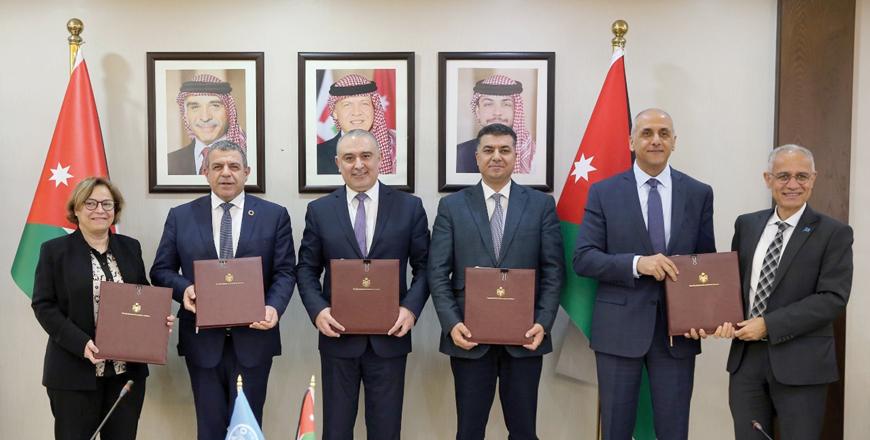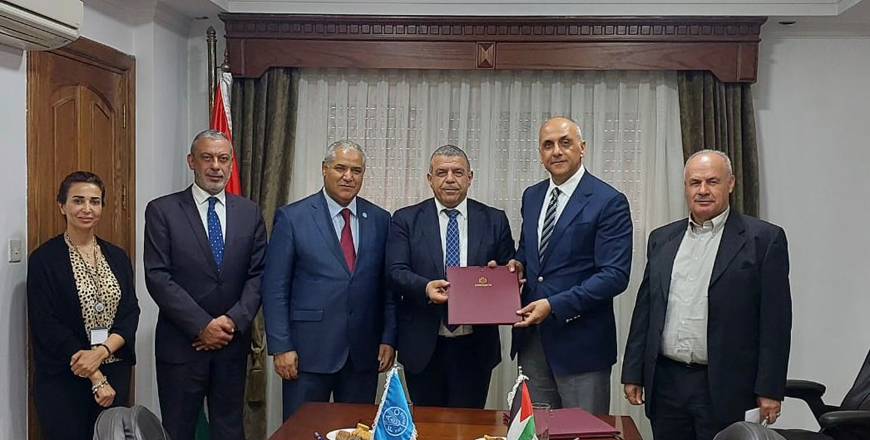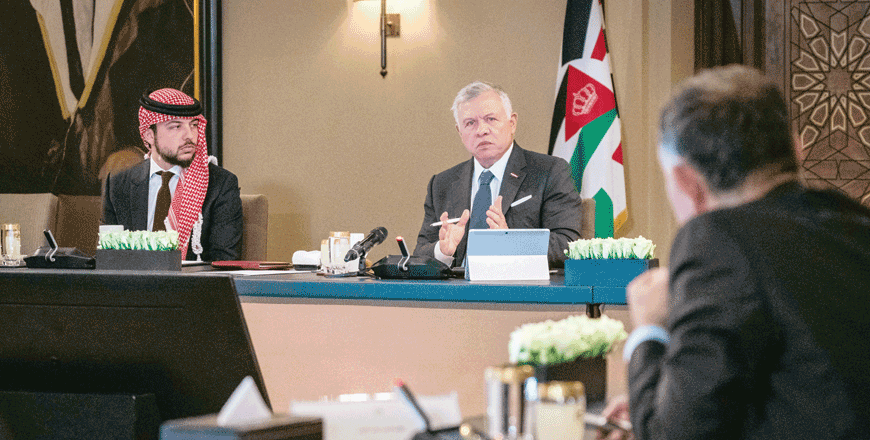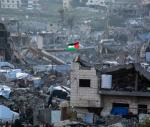You are here
Swedish King, Queen meet environment sector representatives in Jordan
By Rayya Al Muheisen - Nov 17,2022 - Last updated at Nov 17,2022
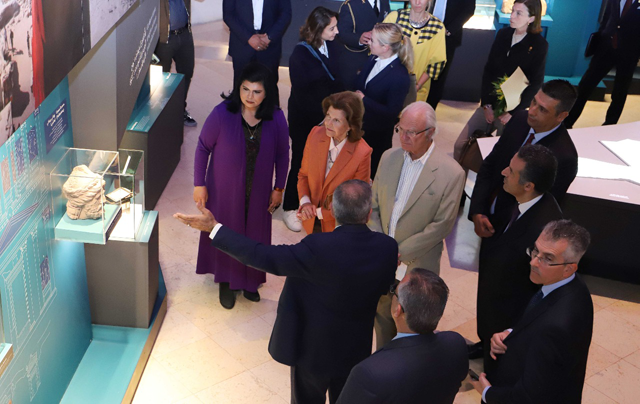
King Carl XVI Gustaf and Queen Silvia of Sweden on Thursday visit Manara Arts and Culture, a cafe and a cultural hub in the capital’s Jabal Luweibdeh neighbourhood, on Thursday (Petra photo)
AMMAN — King Carl XVI Gustaf and Queen Silvia of Sweden on Thursday visited Manara Arts and Culture, a cafe and a cultural hub in the capital’s Jabal Luweibdeh neighbourhood, and met with environment sector representatives.
Their Majesties, accompanied by HRH Princess Rym Al Ali, met with HRH Basma bint Ali, founder of the Royal Botanical Garden of Jordan.
The environment sector representatives briefed the Swedish King and Queen on the critical water, environment, energy and food security challenges that both Jordan and the region are facing.
The meeting comes in parallel with the Sharm El Sheikh Climate Change Conference (COP 27).
Environment Minister Muawieh Radaideh said that “climate change is not one country’s problem, but a global problem that doesn’t recognise lines on the map”.
“We live in a challenging neighbourhood. It’s compounded with climate-related challenges,” Radaideh added.
“Our region is projected to witness 29 per cent more climate change impact than the rest of the world,” Radaideh added.
The environment minister added that in light of climate change impact, there will be less rain, which creates more challenges for the agriculture sector, not to mention stressed forests and less economic opportunities.
“However, we need to turn these challenges into opportunities,” Radaideh said, highlighting the country’s climate change policy up until 2050.
Radaideh stated that Jordan is the second poorest country in terms of water in the world and the country is looking for new water sources .
Exodus of refugees has increased the population by 20 per cent in almost 10 years, Radaideh added.
He added that the arrivals of refugees added pressure not only on the water sector, but also on education, health and infrastructure.
The minister said that 29 per cent of Jordan’s electricity comes from renewable sources, adding that 16 per cent of vehicles in the Kingdom are electric and hybrid.
Touching on the signing of a declaration of intent agreement with Israel on Thursday, Radaideh said that the agreement states that the two countries along with Palestine can jointly save the Dead Sea by reducing the decline in water levels and bringing life to the Jordan River.
The environment minister also said that Jordan’s carbon emissions are quite low. “Jordan emits 0.06 per cent Carbon,” said Radaideh.
On the sidelines of the event, Stockholm International Water and Irrigation (SIWI) Executive Director Torgny Holmgren told The Jordan Times that SIWI will open a regional office in Amman.
Holmgren added that SIWI will launch their activities “hopefully” by the beginning of 2023.
“Jordan’s most prominent water-related challenge is water scarcity. At SIWI, we are a leading expert in water management NGO,” Holmgren said.
Khaled Irani, director of the Royal Society for the Conservation of Nature, stated that Jordan enjoys “unique biodiversity and landscape”.
“We have plant species from three continents,” Irani said, noting that the Kingdom is home to 2,500 plant species. “One per cent of the world’s plants exist in Jordan,” Irani said, highlighting the country has over 160 types of hard corals, and 20 soft corals.
“Ten of the mammals that exist in Jordan are globally threatened,” Irani said.
Jordan is also well-known for its prominent bird migration pathways, he added.
Also during the event, Yana Abu Taleb, CEO EcoPeace Jordan, said: “We are very focused on climate security, water security, energy security and food security.”
Nabil Assaf, Food and Agriculture Organisation’s representative in Jordan, said that “there’s a deep depletion in our resources in Jordan”.
“We need to find different ways to ensure food sustainability in Jordan,” Assaf added.
Agriculture sector is consuming 51 per cent of water resources available in the Kingdom, said Assaf.
“In order to pursue self-sufficiency in food production as well as food security, we need to be more efficient in using our water resources,” Assaf added.
“We’re living in a climate change sensitive hotspot, making Jordan vulnerable to higher temperatures, lower rainfall, and a rising risk of floods and droughts. This translates to vulnerability in many sectors such as agriculture, health and water,” according to a briefing read out at the event.
“Adaptation is urgently needed,” according to the briefing.
The briefing also highlighted Jordan’s adoption of waste management systems in the capital, in addition to smart agriculture projects.
“Jordan is a globally recognised eco-tourism destination,” according to the briefing.
“But it’s time to scale up these success stories and develop new projects through partnerships, investments and knowledge transfer at local, regional and international levels,” it said.
“The opportunity to do so with Sweden has never been greater,” the event heard.
Related Articles
AMMAN — The government on Thursday signed a project agreement with the UN Food and Agriculture Organisation (FAO) titled “Building Resilienc
AMMAN — The Environment Minister, Muawieh Radaideh, and the representative of the Food and Agriculture Organisation (FAO) in Jordan, Nabil A
AMMAN — His Majesty King Abdullah on Tuesday was briefed on the government’s programme to implement the Economic Modernisation Vision in the


